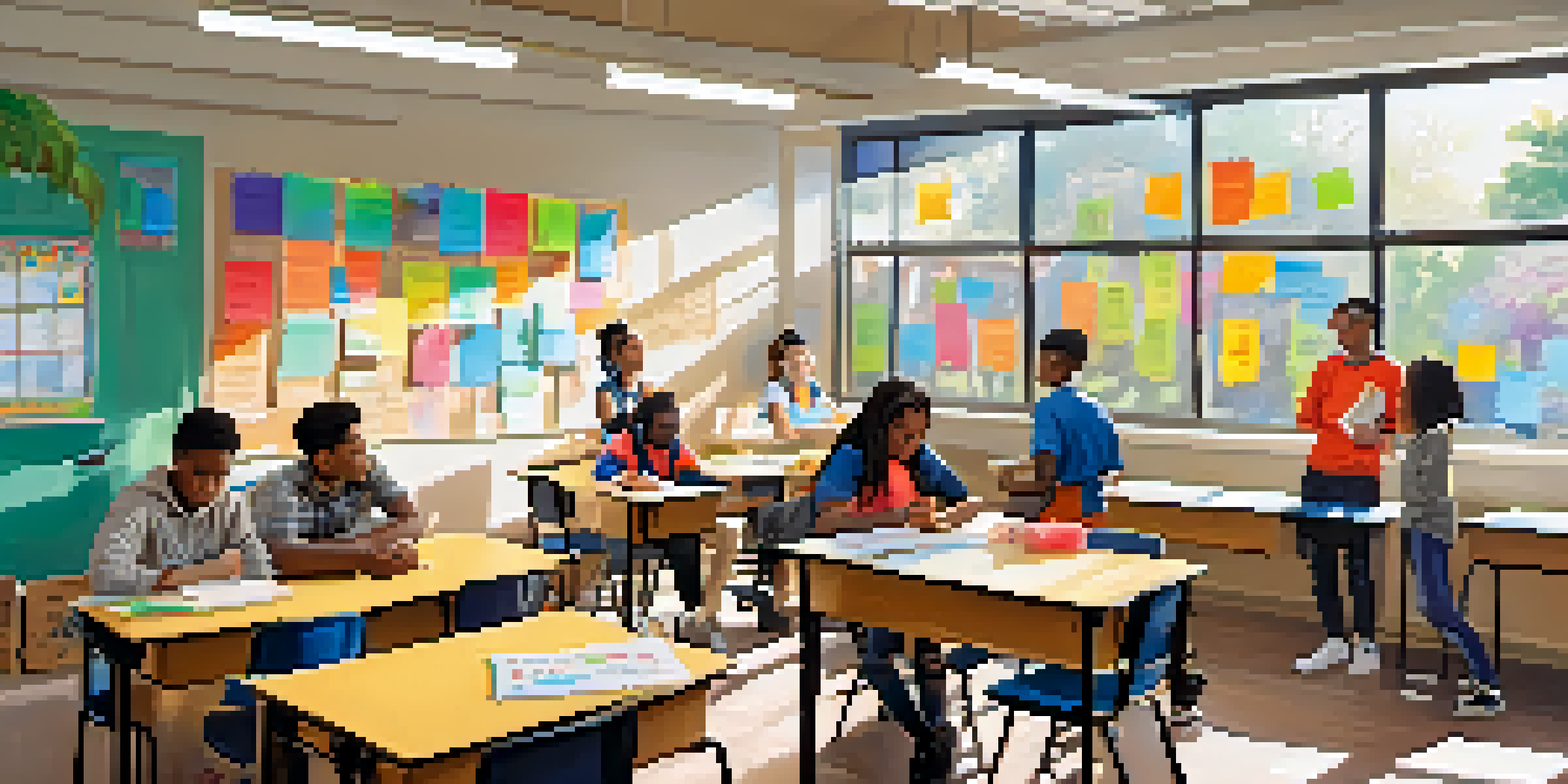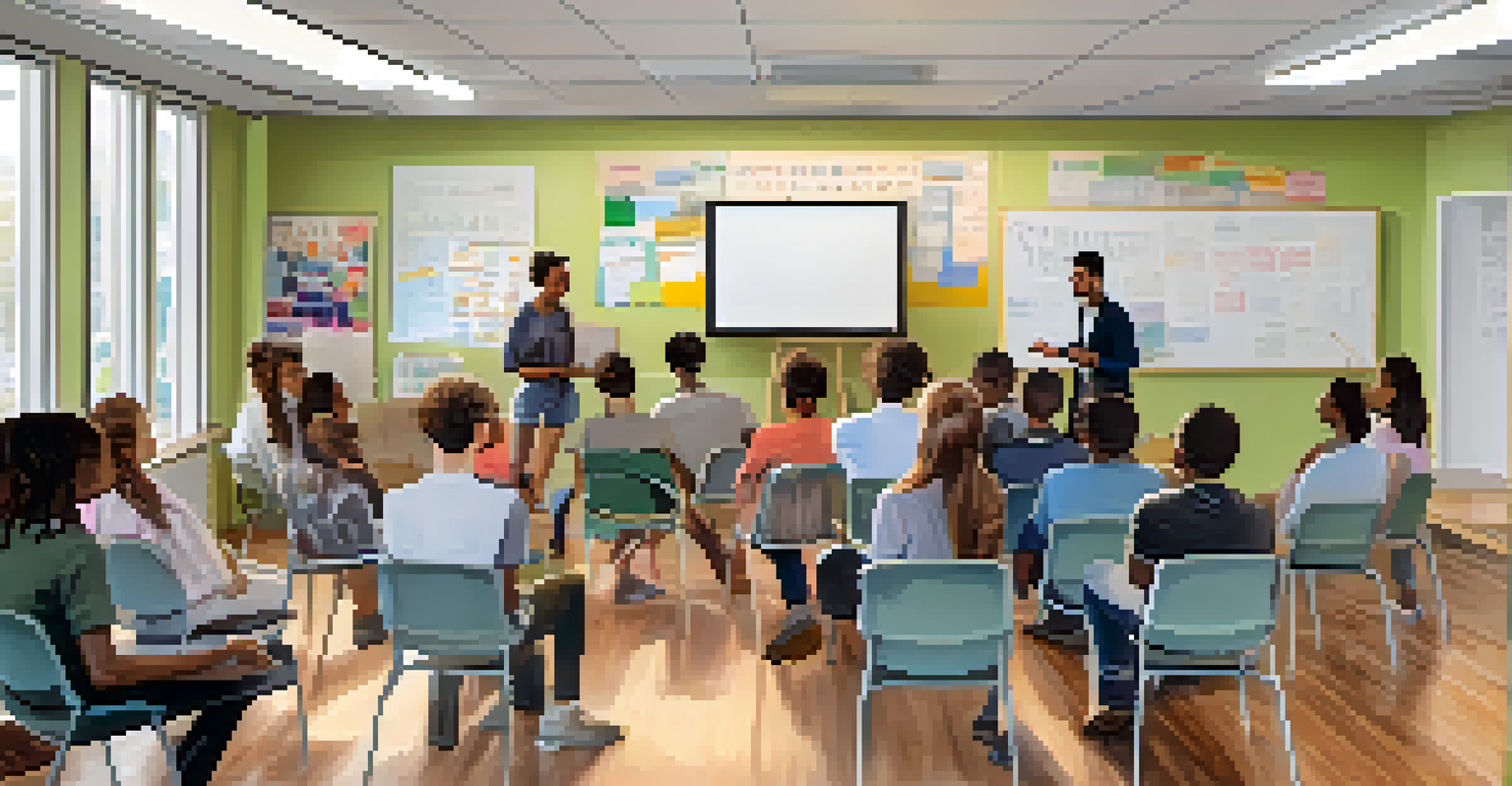Life Skills Training: Equipping Youth for Healthy Choices

Understanding Life Skills Training and Its Importance
Life skills training encompasses a variety of competencies that enable young people to navigate daily challenges. These skills include problem-solving, decision-making, and effective communication, which are essential for personal development. By equipping youth with these skills, we help them build resilience and confidence in their choices.
Life skills are the tools we need to navigate the complexities of everyday life.
In today’s fast-paced world, youth face numerous pressures and decisions that can significantly impact their health and well-being. Life skills training provides them with the tools to make informed choices, particularly in areas like nutrition, relationships, and mental health. This proactive approach ensures they are not just reacting to situations but actively managing their paths.
Moreover, developing these skills early on can lead to better life outcomes. Studies show that young individuals who participate in life skills training are more likely to resist peer pressure and engage in healthier behaviors. In essence, it lays the groundwork for a brighter, healthier future.
Key Life Skills for Healthy Decision-Making
Some fundamental life skills include critical thinking, emotional intelligence, and assertiveness. Critical thinking allows youth to assess situations logically, weighing pros and cons before making decisions. Emotional intelligence helps them understand their feelings and the feelings of others, which is vital in forming healthy relationships.

Assertiveness is equally important, as it empowers young people to express their needs and boundaries clearly. For instance, a youth who knows how to assertively say 'no' is less likely to succumb to peer pressure regarding unhealthy habits. These skills work in tandem, making decision-making a more confident process.
Life Skills Boost Resilience
Equipping youth with essential life skills fosters resilience and confidence, enabling them to navigate challenges effectively.
By focusing on these key life skills, youth can navigate the complexities of adolescence with greater ease. They become equipped to face challenges head-on, fostering a habit of making choices that align with their values and health goals.
Creating a Supportive Environment for Learning
A supportive environment plays a crucial role in the effectiveness of life skills training. This includes both family and community support systems that encourage open communication and positive reinforcement. When young people feel safe to express themselves, they are more likely to engage in learning and practice these essential skills.
The greatest gift you can give someone is your time, your attention, your love, and your concern.
Schools also have a significant part to play in this process. Implementing life skills programs within educational curricula can create a culture of support and understanding. When educators prioritize these skills, they help students see the importance of health and well-being in their day-to-day lives.
Additionally, peer support groups can amplify this learning environment. When youth collaborate and share their experiences, they learn from one another, reinforcing the skills taught. This collective approach not only enhances the learning process but also strengthens community bonds.
Engaging Youth in Life Skills Training Programs
Engagement is key to successful life skills training. Programs that incorporate interactive and hands-on activities tend to resonate more with young people. For instance, role-playing scenarios can help them practice decision-making in real-life contexts, making the learning experience more relatable and impactful.
Moreover, technology can be a powerful ally in engaging youth. Utilizing apps, online workshops, and social media can make life skills training more accessible and appealing. By meeting them where they are, we can spark interest and promote ongoing participation in these essential programs.
Supportive Environments Matter
Creating supportive environments through family, community, and schools enhances the effectiveness of life skills training.
Finally, incorporating youth feedback into program design can enhance engagement. When young people feel their voices are heard, they are more likely to invest in the training. This collaborative approach fosters a sense of ownership and responsibility in their learning journey.
Life Skills Training and Mental Health Awareness
Mental health awareness is a critical component of life skills training. By educating youth about mental health, we equip them to recognize symptoms in themselves and others, fostering a culture of understanding. This knowledge encourages them to seek help when needed and supports overall emotional well-being.
Incorporating mindfulness and stress management techniques into life skills training can further enhance mental health. Teaching youth how to manage stress through techniques like deep breathing or journaling can empower them to handle life's pressures more effectively. These practices promote resilience and emotional regulation, essential for making healthy choices.
As mental health becomes a more prominent topic, integrating it into life skills training can have profound effects. It not only normalizes discussions around mental health but also prepares youth to cope with challenges, ultimately leading to a healthier mindset and lifestyle.
Measuring the Impact of Life Skills Training
Assessing the impact of life skills training is essential for understanding its effectiveness. Various methods, such as surveys and feedback forms, can be utilized to gather insights from participants. These tools help identify areas of success and those needing improvement, ensuring continuous program enhancement.
Additionally, tracking behavioral changes among participants can provide valuable data. For example, if a significant number of youth report healthier eating habits or increased confidence in decision-making, it reflects the program's success. This kind of measurable impact underscores the importance of life skills training in fostering healthy choices.
Engagement Drives Success
Interactive and technology-driven approaches engage youth in life skills training, promoting better participation and ownership.
Moreover, sharing success stories can inspire others to participate. Highlighting real-life examples of youth who have benefited from life skills training can motivate peers and communities to embrace these programs. Ultimately, showcasing the positive outcomes reinforces the value of investing in youth development.
The Future of Life Skills Training for Youth
As we look ahead, the future of life skills training appears promising. With ongoing advancements in technology and a growing understanding of mental health, these programs can evolve to meet the needs of today's youth. Innovations in delivery methods, such as virtual reality and gamification, can make learning even more engaging.
Moreover, there is an increasing recognition of the importance of life skills training within educational systems. Policymakers are beginning to prioritize these programs, advocating for their inclusion in school curricula nationwide. This shift could lead to widespread availability and accessibility for all youth.

Ultimately, equipping young people with life skills today paves the way for healthier choices tomorrow. By investing in their development, we nurture a generation prepared to face challenges with confidence and resilience, leading to a brighter future for everyone.